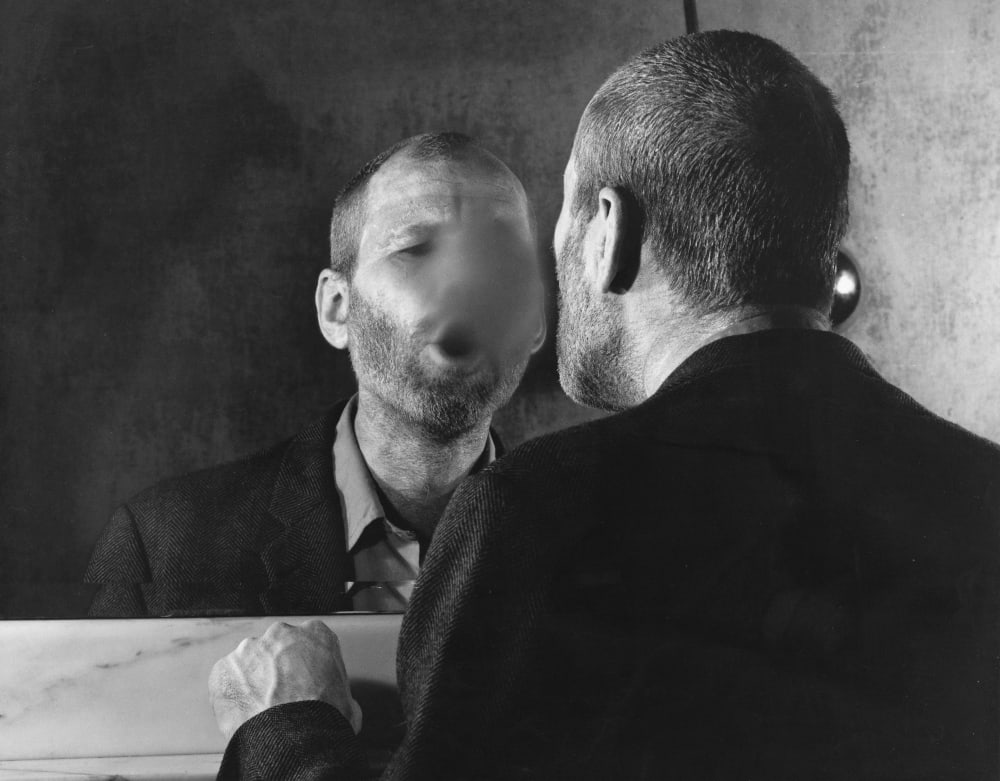Fig. 3 Memory Trace: DIETER APPELT
-
Introduction
Dieter Appelt has been using photography and film, drawing and sculpture in his art since the 1970s to measure up to the world and the body. For the 9-metre-high Corner Space of our gallery, the artist has created a new work: Fig. 3 Erinnerungsspur (Memory Trace), a metric, contrapuntally orchestrated sculpture plus a wall notation.
Since the 1970s Dieter Appelt’s oeuvre has featured branching ramifications, conjectures and concentrations as material components of installations, actions and artistic dispositives. In these works, branches are knotted into a vehicle for thinking and dwelling. The branchings proffer temporary protection, housing, or else they embrace the body onto death (Vergrasung, 1978/79) in an apparent reconciliation with nature. The architecture in which all his future branching (ramifications) originated was posited in the early work Der Augenturm (Eye Tower), which Appelt showed on Monte Isola in 1977. The Augenturm was a ten-metre-high tower made out of branches, standing in water and held together by pieces of fabric. Appelt couched himself in it, in keeping with the proportions of Vitruvian man. His body dwelled in each of the architectonic conditions of the tower, from the water to the highest basket, adapting itself to the construction as if to an abode, so that it was unclear whether the body accreted life or itself entered into the cenotaph of the gazes. The Augenturm and the accompanying actions proposed spaces of time, arrival and departure, beginning and end. As in many of his subsequent works, Appelt constructed a parametrical space captured in sounds, in shapes, in events, suitable for rendition, then formed this mathematically and physically into an artwork through the sequence of calculatory steps. The drops that the work engenders spatially fringe time.
The principle of ramification and unification, of fleeing, of breaches and tears in possible systems, indicates the proximity of Dieter Appelt’s art to music. His is a work of manifoldness, comparable to György Ligeti’s polyphonic compositions, such as Ramifications (1968/69), where, as the composer himself said, the notes branch out from “dense and static” to “broken up and mobile.” Dieter Appelt’s photographic, filmic and sculptural work is characterised by the sounding and fading of the note, the superimposition and layering of light and material, the unravelling of the manifest, and the, for us, invisible, strict compositional interventions in the manifoldness of the duration.
The new work for the nine-metre-high Corner Space at Galerie Thomas Schulte is a more than five-metre-high sculpture constructed of beech wood bound together with linen cloth and dipped in egg tempera. On the wall is a notation taken from a drawing and enlarged. Like the tower, this notation holds itself in the fragment and the whole, in the gesture of a Chinese ideograph, at rest and simultaneously in motion, seeming to point in all directions. The sculpture and the drawing support an infinite expansion, touching the infinite in the finite ground. Transferred to space and plane, Fig. 3 Erinnerungsspur stands for an encounter of space, sign and time. Like an infinite sculpture (after all, one easily thinks of Brancusi), it grows out of our eyes and beyond our gaze, precisely captured yet unattainable. In a posthumous text about Chinese ideograms translated by Ezra Pound, Ernest Fenellosa wrote that a noun, like a thing, only condensed the congress of processes, like a snapshot cuts sections through actions – everything is interlinked. For this reason there could not be a full sentence, except for the sentence that would take a lifetime to utter. In Fig. 3 Erinnerungsspur the cloths are tightly wrapped around the wooden rods for the encounter of the moments, and, like the signs to the wall, snuggles up to the body, to protect, to defend, and to leave precisely attuned traces for which a memory will still have to seek a correspondence.
Text: Hubertus v. Amelunxen -
Installation Views
-
Works
-
Inquire about works by Dieter Appelt

-
Artists on view




